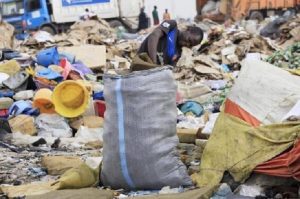Lagos, the commercial capital of Nigeria and the economic hub of West Africa is currently the most populous city in Africa, it has a population of 21 million as at January 2015, making it Africa’s largest city and the third largest city in the world.

The population has an average annual growth rate of 3.2% and is estimated to be over 30 million by 2025. The large population creates a viable market for manufacturing and retail of consumer goods and other services, goods of which are mostly produced in plastics.
Here, like every other state in Nigeria, waste is a common phenomenon, a 2022 report by the United Nations Industrial Development Organisation (UNIDO) shows that Nigeria generates over 32 million tonnes of waste annually. In the report, plastic waste accounts for 2.5 million tonnes. It was further disclosed that Nigeria is among the top 20 nations that contribute 83 percent of the total volume of land-based plastic waste that ends up in major oceans. This indicates the significant number of wastes being generated daily in the country.
Waste can be found in many parts of the country. Most streets are littered with plastics and metallic parts. Floating cans, nylon water sachets, empty bottles pile up on the streets, outside homes and along the waterways and lagoons creating eyesores and putrid smells. The waste pickers go in and search for recyclable materials that can be resold, turning problems into advantages. In most Nigerian cities, waste picking represents a vital survival strategy for the poor.
But the narrative is changing. There is a paradigm shift towards turning trash into cash. With the population of 21 million people, Lagos State reportedly generates 870,000 tonnes of plastic waste annually. Meanwhile, a report shows that only 40% of its waste is collected, and just 13 per cent is recycled which births the need for recycling and the embracement of sustainable and responsible production (SDG 12).
Nasiru Abubakar is a waste picker in Ojo LGA of Lagos. He specifically looks around for cartons, empty pure water sachets, plastic bottles and metal objects. When speaking to our reporter, Abubakar disclosed how much he makes from the venture he engages in.
“It depends on the quantity you have. When I get to Alaba Rago, I will separate everything here one by one. Sachet is N50 per kg. Carton is also N50 per kg. While iron is N300 per kg. If I fill this bag very well, it is more than 10 kg. And I’ll make, let’s say N3,000,” he said.
Not many people know that there is monetary value in picking waste. Some just believe that the waste pickers only help to clean their environment.
“Alaba Rago is the point of exchange. That is where we exchange all things for money. We have a scale to measure what we have,” Abubakar said, adding that he works every day.
During a visit to Ajeromi Ifelodun Recycling Hub in Ajegunle area, an initiative of Circularity Africa Limited, a group of women and young people were seen sorting plastic wastes and working in the premises.
Mr. Adewole Taiwo, a co-founder of the Hub, disclosed that the women earn from three to four sources.
“The women sorting these plastics are mostly street sweepers. Once they finish the street sweeping around 10am, they come here for extra income. They also come with plastics, get paid for it and also for sorting the plastics to different categories,” he said.
Apart from the profits the waste pickers make, they are very vital to the recycling chain as they make Lagos city cleaner, help local recycling companies get raw materials who in turn sell to the office takers then to the big companies who use this waste as their raw materials to maximise their cost of production.
One of the women sorting told our correspondent that she can sort about 25-30 kgs per day which amounts to over N700. Like Abubakar, she is not only making the city of Lagos cleaner, but also making money from this work that many have described as dirty.
Development of a nation starts locally; we need to embrace community recycling for effective waste management. Waste management is a multi-million-naira sector yet to be fully explored.
All local governments should support indigenous community recycling initiatives for a cleaner city.
By Oluwakeji Onabajo, Deborah Oiza Yusuf and Damilare Adeleye. Article written as part of the Young Media for Climate Justice initiative
